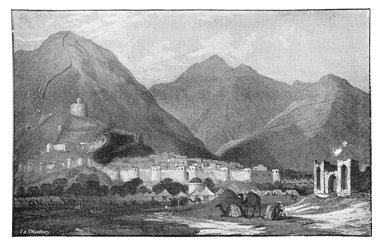|
The Return to Cabul
There is little more to add. It had been part of
Elphinstone's shameful bargain with Akbar Khan that
Jellalabad and Candahar should be evacuated before
the army of Cabul should reach the former place, and
orders had been sent to General Sale in Jellalabad
and General Nott in Candahar to abandon these towns.
Luckily, these officers were of the right British
stamp, and they refused to obey. Akbar Khan besieged
Sale in Jellalabad ; Sale not only held that place
but gave battle to the Afghans outside the fort,
routed them, and made ready to co-operate with
General Nott at Candahar for a forward movement on
Cabul. But the faculties of Lord Auckland, the
Governor-General, seemed paralysed. Regardless of
British prestige, the very keystone of our rule in
India, he ordered the precipitate recall of all the
troops in Afghanistan. Luckily, again, his term of
office was just drawing to a close, and Lord
Ellenborough came out to take the reins of
government. At first he issued a proclamation
endorsing the withdrawal from Afghanistan, but more
spirited counsel prevailed in the end. The
re-conquest of Cabul was accomplished by the entry
of General Pollock into the capital on September 15,
1842, when it was found that the unfortunate Shah
Soojah had paid the penalty of the greatness thrust
on him by English diplomacy, and had been
assassinated by the people he had been set to rule.
Of the English ladies and children who had been
taken under the protection of Akbar Khan the story
has been written in a once famous book, Lady Sale's
Journal. The husband of that lady, General Sir
Robert Sale, was sent to recover the captives, who
had suffered innumerable hardships.
General Elphinstone had died—the best thing that could
happen for his fame; the rest were found in a hill
fort in the Indian Caucasus, in charge of a chief,
who, having heard of Akbar Khan's defeat, was easily
bribed to surrender his trust. The retreat from
Cabul had begun on January 6, but the news did not
reach England till March 7.
 |
CABUL IN 1839.
Cabul, the seat of government of the
Ameer of Afghanistan, is at the present
time (1897) an open town, though it was
formerly surrounded by walls of brick
and mud. The only building of any
importance is the Bala Hissar, or
Citadel, containing the apartments of
the Ameer. Besides being a place of
great strategic importance, Cabul is the
centre of the trade of Central Asia. |
Site Copyright Worldwide 2010. Text and
poetry written by
Sir Hubert Maxwell is not to be reproduced without
express Permission.
|